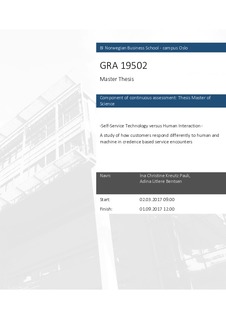| dc.description.abstract | Self-service technologies (SST) have been introduced extensively and promoted
to replace traditional service encounters with human interaction (HI) in the last
years. Advances in digital technologies and artificial intelligence are changing the
world. Despite the great impact on consumers’ everyday life, we know
remarkably little about the interaction between technology and consumers.
Although researchers in the past years have added valuable findings to the field of
SST, some questions still remain unclear, and there are a number of contradictory
conclusions.
This study aims to extend the present research of SST, by examining how
customers respond differently when they interact with a machine instead of a
human during a credence based service encounter. Drawing from theories of
person sensitivity bias, service quality, attribution, satisfaction and behavioral
intentions, we find that humans are evaluated more positively than machines after
a successful service encounter, and less positively if the service encounter is
unsuccessful.
The research provides a thorough review of research in SST and HI in service
encounters, service quality, attribution theory, cognitive and affective satisfaction,
and behavioral intentions. Based on the literature review we develop 7 hypotheses
that we tested using a 2x2 factorial design. The empirical testing was carried out
using four different scenarios with 240 respondents, in the age range from 24 to
69. The data collected in the survey is analyzed and validated to identify the
relationship between the different constructs. Theoretical and managerial
implications from the results are given as well as suggestions for future research. | nb_NO |

